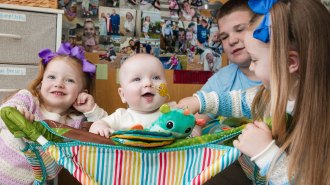Breast-feeding has protective bonus
- More than 2 years ago
The longer a woman breast-feeds her children and the more children she has, the less likely she’ll be to develop breast cancer. This finding may help explain why breast cancer is more common today in developed countries than it used to be.
Valerie Beral of Radcliffe Infirmary at Oxford University in England and her colleagues analyzed data from 147,275 women who had participated in 47 studies in 30 countries. Of these women, 50,302 had breast cancer.
A woman’s risk of developing breast cancer dropped by 7 percent for each child she had and decreased by 4.3 percent for every year of breast-feeding. The effects were consistent in both developed and developing countries and for women of different ages, ethnic backgrounds, and varying childbearing characteristics, Beral’s team reports in the July 20 Lancet.
According to those numbers, if women in developed countries were to have families as large as women did in the 1800s and breast-fed babies as long, breast cancer risk by age 70 would be less than half of what it is today, say the researchers.
Only 2.7 women in a hundred would develop breast cancer by age 70, Beral says.
“To expect that substantial reductions in breast cancer incidence could be brought about today by women returning to the pattern of childbearing and breast-feeding that typified most societies until a century or so ago is unrealistic,” Beral says.
Even so, if mothers in developed countries breast-fed each of their babies 6 months longer than is typical today, the risk of breast cancer could drop by about 5 percent, she says.
Beral attributes two-thirds of the anticancer effect she observed to breast-feeding. If researchers could discover why breast-feeding prevents breast cancer, they might be able to develop a drug that similarly reduces breast cancer risk.







